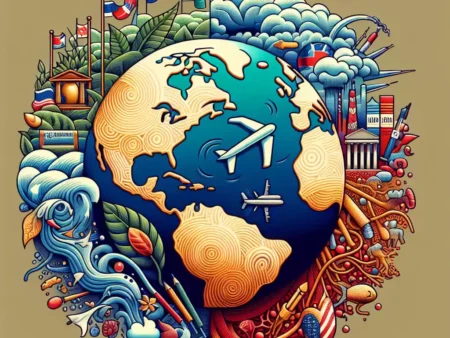Analisis peran diplomasi dalam mencegah konflik internasional: pentingnya dialog dan negosiasi untuk menjaga perdamaian global.
Analisis Peran Diplomasi dalam Mencegah Konflik Internasional
-
Table of Contents
Introduction

Diplomacy plays a crucial role in preventing international conflicts, and this holds true for Indonesia as well. As a diverse nation with a rich cultural heritage, Indonesia has faced its fair share of internal conflicts throughout history. However, through effective diplomacy, the country has managed to maintain peace and stability. This article aims to analyze the role of diplomacy in preventing international conflicts in Indonesia, highlighting key examples and strategies employed by the Indonesian government.
The Importance of Diplomacy in Preventing International Conflicts
Diplomacy serves as a vital tool in preventing international conflicts by fostering dialogue, negotiation, and understanding between nations. It allows countries to address their differences peacefully and find common ground, rather than resorting to violence or aggression. In the case of Indonesia, diplomacy has played a significant role in maintaining regional stability and promoting peace.
1. Historical Context
Indonesia’s history is marked by various internal conflicts, including separatist movements and ethnic tensions. However, the country has successfully navigated these challenges through diplomatic efforts. One notable example is the resolution of the Aceh conflict, which lasted for decades and claimed thousands of lives. Through diplomatic negotiations, the Indonesian government and the Free Aceh Movement (GAM) reached a peace agreement in 2005, ending the conflict and establishing a framework for reconciliation.
2. Regional Diplomacy
Indonesia’s commitment to diplomacy extends beyond its borders. The country actively engages in regional diplomacy to prevent conflicts and promote cooperation among Southeast Asian nations. As a founding member of the Association of Southeast Asian Nations (ASEAN), Indonesia has played a crucial role in fostering dialogue and resolving disputes within the region.
One notable example is Indonesia’s involvement in mediating the Cambodian conflict in the 1980s. Through diplomatic efforts, Indonesia helped facilitate negotiations between the warring factions and played a pivotal role in bringing about a peaceful resolution. This demonstrates Indonesia’s commitment to regional stability and its ability to leverage diplomacy to prevent conflicts.
3. Economic Diplomacy
Economic diplomacy is another essential aspect of preventing international conflicts. By promoting economic cooperation and integration, countries can build interdependence and reduce the likelihood of conflicts arising from economic disparities or competition. Indonesia has recognized the importance of economic diplomacy and has actively pursued it to foster regional stability.
One example of Indonesia’s economic diplomacy is its involvement in the establishment of the ASEAN Economic Community (AEC). The AEC aims to create a single market and production base, facilitating the free flow of goods, services, and investments among ASEAN member states. By promoting economic integration, Indonesia and other ASEAN countries reduce the potential for economic conflicts and create a foundation for peaceful relations.
Challenges and Strategies
While diplomacy plays a crucial role in preventing international conflicts, it is not without its challenges. Indonesia faces several obstacles in its diplomatic efforts, including territorial disputes, religious tensions, and resource competition. However, the Indonesian government has implemented various strategies to overcome these challenges and maintain peace.
1. Multilateralism
Indonesia recognizes the importance of multilateralism in addressing complex international issues. By engaging in multilateral forums such as the United Nations (UN) and ASEAN, Indonesia can work collaboratively with other nations to find peaceful solutions to conflicts. Multilateralism allows Indonesia to leverage collective diplomatic efforts and build consensus among nations, increasing the chances of successful conflict prevention.
2. Track II Diplomacy
Track II diplomacy refers to unofficial, non-governmental channels of communication and negotiation. Indonesia has effectively utilized Track II diplomacy to address sensitive issues and build trust between conflicting parties. Through initiatives such as peace dialogues and people-to-people exchanges, Indonesia has created platforms for open dialogue and understanding, contributing to conflict prevention.
3. Cultural Diplomacy
Cultural diplomacy plays a significant role in preventing conflicts by promoting mutual understanding and respect among nations. Indonesia, with its diverse cultural heritage, has embraced cultural diplomacy as a means to foster peaceful relations. Through cultural exchanges, arts, and educational programs, Indonesia showcases its rich cultural traditions and promotes dialogue, breaking down barriers and building bridges between nations.
Conclusion
In conclusion, diplomacy plays a crucial role in preventing international conflicts in Indonesia. Through historical context, regional diplomacy, and economic diplomacy, Indonesia has successfully navigated internal and external challenges, maintaining peace and stability. Despite the obstacles, the Indonesian government has implemented strategies such as multilateralism, Track II diplomacy, and cultural diplomacy to overcome challenges and promote peaceful relations. By analyzing the role of diplomacy in preventing conflicts, we can appreciate its significance in maintaining global peace and stability.







